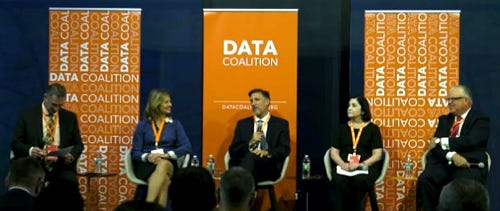Open Standards Pushed as Security Fix for Financial SectorOpen Standards Pushed as Security Fix for Financial Sector
The panelists also underscored the need for highly developed tech skills.
April 24, 2019

REGTECH DATA SUMMIT — Participants on a panel at the RegTech Data Summit in New York City on Tuesday touted open standards as an important part of a comprehensive fix to security woes in the financial industry.
“Open standards would help find criminal activity and financing for terrorists. Criminals don’t commit all their crimes at one bank. They spread them out across several banks so they are better hidden,” said Robin Doyle, managing director, Office of Regulatory Affairs at J.P. Morgan Chase. “We need ways to see that activity across institutions and open standards could do that.”
It’s said that numbers don’t lie. Given financial data is mostly numeric and highly structured, the finance industry is typically seen as the possessors of rock-solid data. But that’s not quite the case. Not because of internal mischief in fudging the math, but because the numbers are not anchored to a common language with finite meanings. This creates confusion in multiple data analysis projects within a single bank, but also between banks, and between government agencies.
“Even regulatory agencies can’t agree on defining what a financial institution is,” said Doyle. “We need to be able to talk about things in a common way to even have a conversation.”

Panelists discuss open standards during the RegTech Data Summit, April 23, in New York City.
The difficulty in getting the various outputs of data analysis to agree lies in a lack of standards, even in something as foundational as definitions of financial institution and financial product types. Beyond creating chaos and a lack of trust in analyses, this also prevents the development of effective criminal behavior monitoring and compliance reporting to regulators.
In other words, transparency is impossible with the data waters so muddied.
The moderator, John Bottega, executive director of Enterprise Data Management (EDM) Council, advocated industry support of the Financial Transparency Act that is currently before Congress. The bipartisan act proposes the transformation of U.S. financial regulatory reporting into open and searchable data. Currently such reporting data is locked in disparate siloes, including in pdf files.
Open data and open standards are a must, the panelists agreed. Ken Lamar, former SVP of the Federal Reserve Bank of New York, said the last recession made the need for better transparency abundantly clear.
“Management Information System (MIS) was used by commercial banks in the financial crisis and no one knew what was in the data so they could cope with the downturn.”
The moderator pointed out that detractors see standards as “a bureaucratic, expensive burden.” The panelists, however, disagreed with that notion.
“Thank God for open standards because I can get money from any ATM in the world because of them,” said Doyle. “Generally speaking, open standards make a lot of sense for banks and customers alike.”
A considerable number of financial products, however, are more complicated than withdrawing money from an account. Technologists aren’t likely to be able to resolve the issues entirely on their own — with or without open standards.
“Tools are good, but knowledge is better,” said Lamar. “Subject-matter expertise is the future for people in this industry. We need technologists to work side by side with subject-matter experts to make sure the tech can handle multiple perspectives, definitions and disparate issues and data correctly, especially in automation efforts.”
The panelists agreed with that prediction but also underscored the need for highly developed tech skills.
“Critical information is ultimately a plumbing problem,” said Matt Red, chief counsel officer of financial research at the U.S. Treasury.
Read more about:
MSPsAbout the Author
You May Also Like


